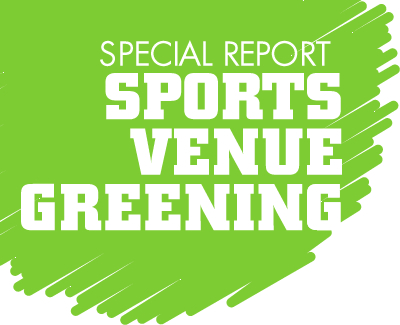The Pittsburgh Pirates have been diverting food waste from all areas of PNC Park to composting since 2009. The Boston Red Sox initiated a program in 2011, starting with restaurants in Fenway Park.
Nora Goldstein
BioCycle July 2013, Vol. 54, No. 7, p. 27
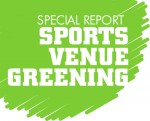
In early January of 2009, AgRecycle, Inc., a source separated organics composting company based in Pittsburgh, Pennsylvania, received a phone call from the Pittsburgh Pirates. The major league baseball franchise was interested in initiating a composting program. “I remember the call vividly, as I grew up in Pittsburgh and started going to Pirates games when I was very young,” says Carla Castagnero, president of AgRecycle. “The person on the phone said, ‘We would like to compost. Can you help us do that?’ I said yes immediately, and we set up a meeting at the ballpark.”
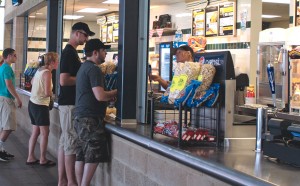
Since AgRecycle began servicing the Pittsburgh Pirates in 2009, PNC Park’s use of compostable products has increased significantly, including at the concession stands. Photo by David Arrigo, courtesy of Pittsburgh Pirates
This let’s do it attitude came directly from the top of the Pittsburgh Pirates organization, according to Burkhart. “When Bob Nutting became Chairman of the Pirates in 2007, he took a deep dive into the organization to find areas where we had to improve in both baseball and business. Bob has a great appreciation for the environment and the positive impact that implementing greening initiatives at PNC Park and in his other businesses could have in helping preserve it.”
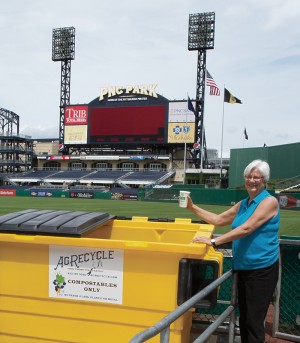
Sissy Burkhart (inset), Cleaning Operations Manager with the Pittsburgh Pirates organization, coordinates the organics diversion program within the ballpark. Photo by David Arrigo, courtesy of Pittsburgh Pirates
In March, Nutting was honored by the Natural Resources Defense Council (NRDC) for his leadership in the sports industry’s movement to adopt sustainable business practices, both with the Pirates and the Nutting family-owned Seven Springs Mountain Resort and Ogden Newspapers publishing company. NRDC has been a key player in the greening of professional and college sports venues (see accompanying article). “Bob is one of the pioneers in the professional sports greening movement that has made sustainability the rule rather than the exception,” said NRDC President Frances Beinecke at the NRDC Game Changer Awards Gala where Nutting was honored. “Bob and the Pirates are on the forefront in leading a cultural shift toward environmental responsibility in sport.”
Rolling Out Organics Diversion
During contract negotiations, Castagnero explained to the Pirates organization that AgRecycle’s composting permit only allows it to take source separated organic waste streams therefore no recyclables and trash are allowed. “From day one, to the middle of our fifth year with the Pirates, they have only ever given us a clean stream,” she notes.
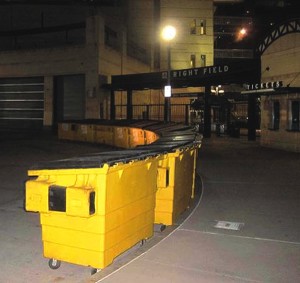
Food waste and compostables are collected in smaller carts and then emptied into 2 cubic yard containers that are set out in a cul de sac near the right field gate. Photo by David Arrigo, courtesy of Pittsburgh Pirates
AgRecycle, which started in 1991 as a yard trimmings composter, began its food waste collection service in 2006. From the beginning, it has used the color yellow for all components of its food waste program — the cans in the kitchen, all signage, containers and its collection trucks. “We call it the yellow trail,” she adds, “which facilitates training and program operations because of the consistency.” The first step in bringing a new generator on board is to conduct a kitchen audit to determine what is and isn’t compostable. For example, parchment paper can have silicone threads running through it, and can’t be included with the food waste or it can be silicone-free and appropriate to divert to composting. That is why it was key that AgRecycle was given access to the kitchens within the ballpark prior to the start of the 2009 season.
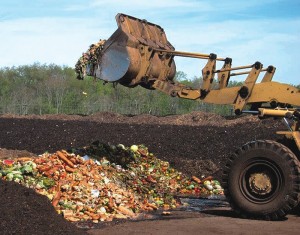
Food waste from the Pirates and other accounts throughout the Pittsburgh region are composted at AgRecycle’s facility in Washington County, Pennsylvania.
In 2010, the Pirates began diverting food waste from throughout PNC Park, including the seating area of the stadium known as “the Bowl.” Fans routinely leave uneaten food and containers under their seats. (PNC Park does not have any sorting stations for fans to use at this time.) At the conclusion of every game, prior to sweeping and pressure washing the Bowl, crews go row by row to pick up the bulk trash. They are followed by a green team that collects the recyclables. The bulk trash is sorted by a dedicated team of 10 people in the ballpark’s recycling center (located in the service tunnel) to separate out the compostables. Next, the compostables are taken from the recycling center in yellow tip carts and emptied into AgRecycle’s yellow, 2 cubic yard (cy) containers. The last step is to wheel the 2 cy containers to the cul du sac outside the right field gate for AgRecycle to unload. The containers are serviced in the morning following every home game.
During the off-season and when the team is on the road, the Pittsburgh Pirates rent the stadium facilities for events such as concerts, weddings and corporate meetings. Between those events and servicing the restaurants that are open to the public, AgRecycle collects food waste from PNC Park year-round, as needed. Overall, diversion at the park has been so successful that the Pirates decided to close off the garbage chutes inside the stadium that facilitated moving trash from the higher level stands.
Greening Fenway
In 2008, the Boston Red Sox, in collaboration with NRDC, rolled out a five-year plan to bring “green” practices to Fenway Park. Over that time period, the Red Sox organization switched to low-flush toilets and waterless urinals, began using biodiesel in its mowers, and installed energy-efficient HD LED message boards and solar thermal panels that heat the hot water used in several of the kitchens at the ballpark. “The solar thermal panels account for about one-third of the hot water used in Fenway Park, and replace the natural gas traditionally used for the process,” says Christopher Knight with the park’s facilities group that oversees greening initiatives.
On the source reduction and waste diversion side, volunteers on the Red Sox Poland Spring Green Team collect plastic bottles and cups during home games, which has boosted recycling rates (other materials are recycled as well). The Red Sox also have a robust food donation program to Boston area shelters.
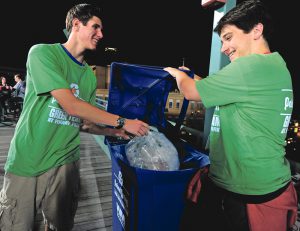
At Fenway Park, the Red Sox “Green Team” collects plastic bottles and cups during home games. Photo courtesy of Boston Red Sox
This season, the Red Sox expanded the program to collect food waste, such as cooked sausage and soft pretzels, from concession stands throughout the ballpark. Everything sold in the concession stands is premade so there isn’t any food prep waste. Staff at the concession stands place the food waste in boxes, which are brought to a central location in the stadium to be diverted to composting. The team plans to continue working to improve and expand the organics diversion program.
In 2012, the Boston Red Sox joined the U.S. EPA’s Food Recovery Challenge and was recognized for their exemplary programs later that year. Through EPA’s Food Recovery Challenge, New England-area businesses are rethinking opportunities to reduce food waste going to landfills, and they are making a real difference,” said Curt Spalding, regional administrator of the U.S. EPA’s New England office. “Sending food waste to a landfill represents a missed opportunity to reduce costs, protect the environment and help our neighbors.”
Top-Down Commitment
From AgRecycle’s perspective, success in composting at Major League ballparks is dependent on the team’s commitment to the program. “Ballparks are so complicated because they have private suites, clubs, different restaurants, concessions and the stands,” explains Castagnero. “It’s not that there is just one location that prepares and serves the food. Composting has to be something that the team owners want, and in turn, the team coordinates the staff and practices internally.
“The Pittsburgh Pirates talk about their greening initiatives in real terms. They have real goals on how much they want to get recycled and composted each year, how much energy and water they want to save and overall, how to continually improve their sustainability practices. With the Pirates organization, composting was truly a top-down commitment.”


